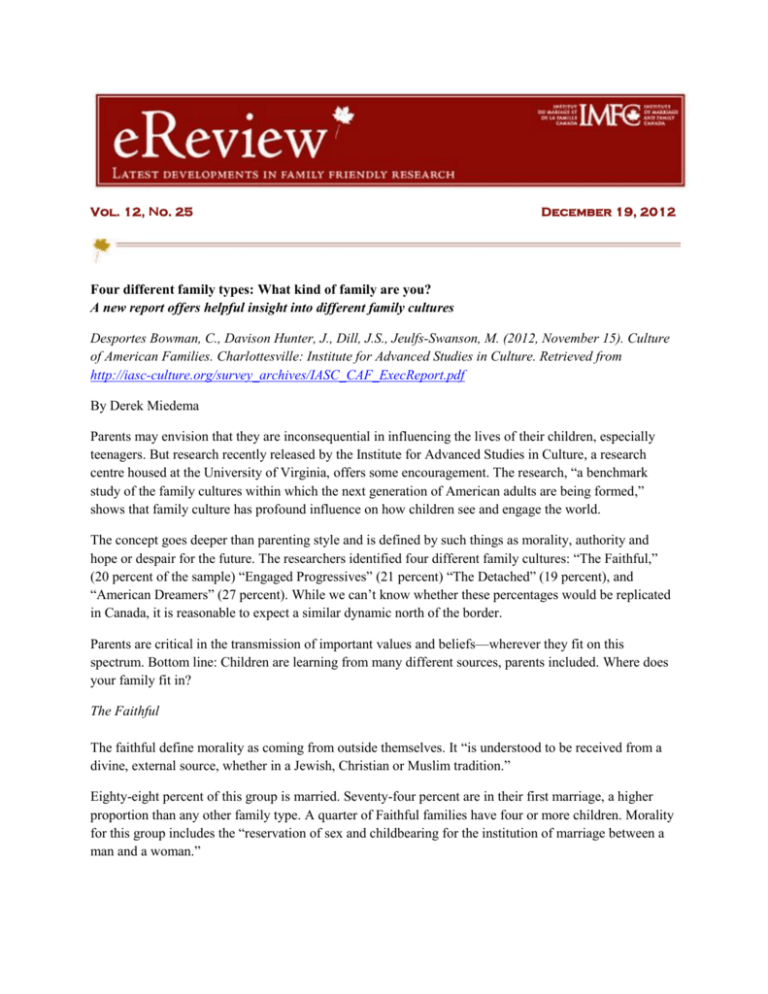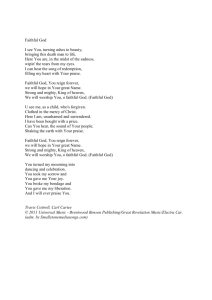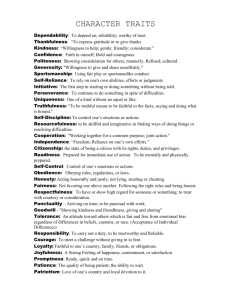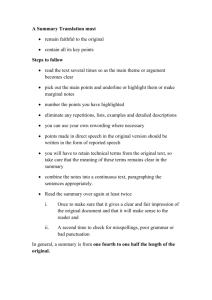Four different family types - Institute of Marriage and Family Canada
advertisement

Vol. 12, No. 25 December 19, 2012 Four different family types: What kind of family are you? A new report offers helpful insight into different family cultures Desportes Bowman, C., Davison Hunter, J., Dill, J.S., Jeulfs-Swanson, M. (2012, November 15). Culture of American Families. Charlottesville: Institute for Advanced Studies in Culture. Retrieved from http://iasc-culture.org/survey_archives/IASC_CAF_ExecReport.pdf By Derek Miedema Parents may envision that they are inconsequential in influencing the lives of their children, especially teenagers. But research recently released by the Institute for Advanced Studies in Culture, a research centre housed at the University of Virginia, offers some encouragement. The research, “a benchmark study of the family cultures within which the next generation of American adults are being formed,” shows that family culture has profound influence on how children see and engage the world. The concept goes deeper than parenting style and is defined by such things as morality, authority and hope or despair for the future. The researchers identified four different family cultures: “The Faithful,” (20 percent of the sample) “Engaged Progressives” (21 percent) “The Detached” (19 percent), and “American Dreamers” (27 percent). While we can’t know whether these percentages would be replicated in Canada, it is reasonable to expect a similar dynamic north of the border. Parents are critical in the transmission of important values and beliefs—wherever they fit on this spectrum. Bottom line: Children are learning from many different sources, parents included. Where does your family fit in? The Faithful The faithful define morality as coming from outside themselves. It “is understood to be received from a divine, external source, whether in a Jewish, Christian or Muslim tradition.” Eighty-eight percent of this group is married. Seventy-four percent are in their first marriage, a higher proportion than any other family type. A quarter of Faithful families have four or more children. Morality for this group includes the “reservation of sex and childbearing for the institution of marriage between a man and a woman.” Because society at large is progressively moving away from these ideals, families of this type tend to see decay in the culture around them. Nonetheless, through community and prayer, Faithful parents are confident that their children will continue in this morality even as the world around them goes in the opposite direction. Engaged Progressives Engaged Progressives are parents who see their role as preparing their children to be “responsible choosers, weighing alternatives, thinking carefully through courses of action in advance.” The Golden Rule is paramount in defining whether a person is good or bad; the application of the rule is softened by “honesty, openness, empathy, and rational explanation.” How do Engaged Progressive families look on the ground? Eighty percent of these parents are married, with 63 percent still in their first marriages. Their ideal family size is two children. Parents in this group “overwhelmingly describe their relationships with their children as being ‘very close.’ In fact, they are 11 times more likely to say they are close to their children than strict with them.” Engaged progressives have a much more positive view of the world around than do the Faithful, seeing only “moderate decay, if not a world holding steady.” As such, they see less need to protect their children. Their highest aspirations “like those of the Faithful, are that their children will become adults who are honest and truthful, who have strong moral character, and who treat others in a loving fashion.” The Detached In contrast to Faithful and Engaged Progressive families, the study notes that Detached parents “are pulled in many directions simultaneously and often respond by slipping to the sidelines... (t)heir parenting strategy is to let kids be kids and let the cards fall where they may.” Morally, they are not as much relativists as they are “morally overwhelmed and unresolved.” Sixty-seven percent of Detached parents are married, while 54 percent are in their first marriage and they are twice as likely as Faithful parents to have only one child. In the face of outside influences in the lives of their children, only 29 percent believe they still have strong influence on their children once they enter high school. Detached parents are middle-of-the-road people who, when responding to the survey, rarely took a strong stand on any part. This attitude is reflected in how they see themselves as parents as well as how they actually parent their families. For example, “Less than 4 of every 10 (38 percent) say that instructing their children in ‘appropriate moral behavior’ plays an extremely important role in their parenting.” By contrast, 86 percent of other parents say it does. American Dreamers Morality, for American Dreamers, is based on individual truth: half of this group says that the most believable authority in matters of truth is “what their personal experience teaches them” or “what feels right to them personally.” Parents in this group “hope for much and invest even more, pouring themselves fully into their families’ futures.” Single parenthood is common in this group, with large webs of interconnected extended families providing support. Investing in their children is vital to these parents, because American Dreamers “are nearly twice as likely to say their children’s generation will have greater opportunities than their own, than to say they will have fewer.” American Dreamer parents are heavily invested in protecting their children from “negative social influences; 7 of every 10 (68 percent) say they do so, compared to just a third (33 percent) of the Detached.” Eighty-five percent say they are also heavily invested in shaping the moral character of their children. Whether or not you cringe at the direction the culture is moving or celebrate it, your family dynamic is foundational for your children. They need you to help them make sense of the world so go ahead and help them, no matter how hard they push back.







